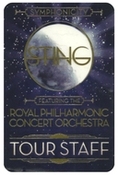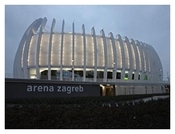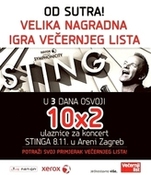
Sting kitschly devastated ''Police'' and his better musical past...
Sting's luck is that he managed to completely change the structure of his audience with the same songs.
Sting embarked on the 'Symphonicity' tour, on which he performed quasi-classical versions of his songs, accompanied by the London Royal Philharmonic Orchestra, at a time when his more knowledgeable fans around the world are justifiably convinced that his best concerts and days are well behind him.
However, unlike fans from the Western world who had the opportunity to see and listen to Sting's highlights live, his Croatian fans are, unfortunately, in a significantly different situation. The concert in July 1997 in the Pula Arena was very good - at that time, Sting still had something to say as an author and creative, and the band was full of musicians hungry for jazzy playing - but before that we could not experience any of his great phases first hand. We even missed the opportunity to hear what the Police's comeback concerts in 2007 sounded like, so their second appearance in two years with a non-rock program is, to be honest, something like picking up Sting's crumbs.
Unfortunately, if we assume that Sting still draws most of his fans from the Police era, tonight's concert at the Zagreb Arena showed that the new wave punk-reggae trio's songs are suffering the most damage on their Symphonicity tour. There may have been some charm in listening to the dishevelled symphonic Roxanne in the musical Moulin Rouge, but if it had been the original, the song would never have become half what it is.
And when the author himself experiments so unnaturally with one of the strongest songs of his career, whose essential rawness and simplicity are in complete conflict with the classical pomp (the Frankensteinian Next To You probably fared even worse), we would really tell him not to appear here again until he gets a decent band together.
But the audience that is cheering Sting on today is really rooting for ''Police'' because he managed to completely change the structure of his audience with the same songs. A large part of the ten thousand people present were just as excited to see him on stage as they were to see ''Scheherazade''s interpreter Onur in the audience, which speaks volumes about the level of demand for ''classics'' in their covers. In fact, the two and a half hour concert sounded like a symphony probably only during the song 'Russians', while the rest sounded like a quasi-romantic kitsch devastation of Sting's legacy ('Every Little Thing She Does Is Magic') or as if someone had removed the rock instruments from the original soundtrack and left the strings in the background, the more recognizable guitar passages and part of the drums.
In short, neither Sting nor the Royal Symphony Orchestra became famous - at best, they sounded correct, especially in songs that did not undergo any special changes such as 'Englishman In New York', 'I Hung My Head', 'Shape Of My Heart', 'Moon Over Bourbon Street' and the elegiac 'Fragile' performed for the encore. And even then it remains surprising that there are 40 musicians on stage, and the sound has no colour, power or volume. Phil Spector would probably call it a crime against music, while the more polished George Martin would probably diplomatically suggest that "there's something to be improved."
Sting must be given credit for appearing to enjoy what he does on stage, but neither he nor the Royal Symphony Orchestra seem to have any inspiration or particular reason for this symbiosis, which, despite all its flaws and limitations, could have provided a less demanding listener with some entertaining and memorable moments.
© Vecernji by Arsen Oremovic
11082010
SET LIST
- If I Ever Lose My Faith In You
- Every Little Thing She Does Is Magic
- Englishman In New York
- Roxanne
- Straight To My Heart
- When We Dance
- Russians
- I Hung My Head
- Shape Of My Heart
- Why Should I Cry For You?
- Whenever I Say Your Name
- Fields Of Gold
- Next To You
- A Thousand Years
- This Cowboy Song
- Tomorrow We'll See
- Moon Over Bourbon Street
- End Of The Game
- You Will Be My Ain True Love
- All Would Envy
- Mad About You
- King Of Pain
- Every Breath You Take
- Desert Rose
- She's Too Good For Me
- Fragile
- Message In A Bottle





